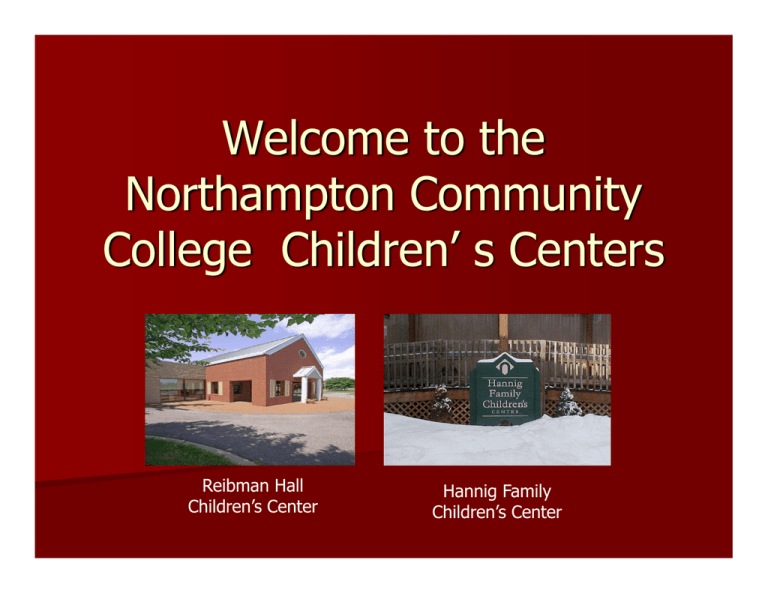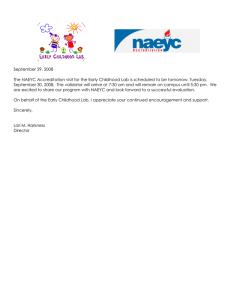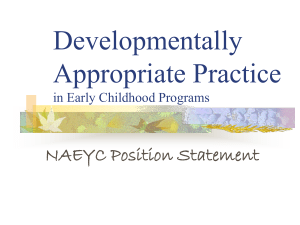Welcome to the Northampton Community College Children’ s Centers Reibman Hall
advertisement

Welcome to the Northampton Community College Children’ s Centers Reibman Hall Children’s Center Hannig Family Children’s Center What guides our practice? Children’s Center Mission Statement “A community of learnerschildren, families, students, faculty, and staff-who embrace uniqueness, inspire respect and model the highest standards in early education sparked by the arts.” Children’s Center Philosophy At Northampton Community College Children’s Center we believe that children learn through play, exploration and discovery. Children grow to their full potential in an environment that is supportive, rich, and challenging. Learning focuses on the whole child by encouraging their cognitive, physical, social/emotional growth as well as their creative expression with our artsbased curriculum. We nurture and educate each child, regardless of race, gender, ability, ethnicity, socio-economic standing, or religion. We believe that every child who enters our center is unique and competent and that the strong foundation laid here will support and create eager, lifelong learners. What standards are we held to? Licensing and Accrediting bodies The Children’s Center is licensed by the PA Department of Public Welfare, and accredited by the National Association for the Education of Young Children (NAEYC) and The Middle States Association of Colleges and Schools. State licensing requirements are met through yearly inspections by the Department of Public Welfare (DPW). In addition, the center participates in the state’s quality improvement program The Keystone Stars Program. We are rated a four-star center, this is the highest rating a center can attain. Accreditation: A mark of high quality! • NAEYC and Middle States accreditation provides a process through which early childhood professionals and families evaluate the program, compare it with professional standards, strengthen the program and commit to ongoing evaluation and improvement, as well as commit to a code of ethical conduct. • NAEYC and Middles States accreditation is renewed every five years. We are proud of our effort to maintain this high quality mark. Quality Early Education: or …. I want to take you higher. Licensing and Accreditations Art as a Way of Learning® Our curriculum emphasizes active exploration of the environment to strengthen the physical, social/emotional, cognitive and creative growth of each child. Art as a Way of Learning® Teachers use strategies and techniques central to Art as a Way of Learning® to plan and implement curriculum. Art as a Way of Learning® We believe the arts provide children with a unique language through which they can both construct and express their imaginations and knowledge. Art as a Way of Learning® Children’s artistic literacy gives them opportunities for critical thinking, problem solving, and reflection. Such opportunities challenge children to communicate to others what they see and know about their worlds and to become more familiar with the artistic expressions of other cultures. Our NCC campus is our Community: . Providing us with rich resources for field trips and research that supports learning! Our NCC Campus Community Special features include: Access to the college campus which serves as a classroom resource for field trips to the children’s library, art shows and cultural and community events. Emergent projects that evolve from children’s interests. Local artists, who model, teach and lend their expertise to the teachers through our “Artist in Residence” program. Journals - serve as a home to school transitional tool - foster literacy development - create a safe place for children to express their emotions. Visual documentation of children’s learning and development. Our Goals for Children Our goal is to teach each child: To communicate and represent what they know and feel Our Goals for Children To create and solve problems critically and creatively Our Goals for Children To connect to their community, family, and culture Our Goals for Children To develop and maintain positive relationships and understanding of self NCC Children’s Center provides Inclusive Early Education for all children: Children with special needs are seamlessly included in our daily programming - UDL: Universal Design for Living Inclusive and least restrictive environment Beneficial for all leaners Design of outdoor and indoor physical environment Design of programming Outdoor Natural Playspace: -an extension of our indoor classroom learning environment -provides rich opportunities for exploration and discovery -opportunities for active physical gross motor experiences Careful guidance and supervision is necessary to keep everyone safe and happily engaged in these learning experiences! Guiding Children’s Behavior: PBS Positive Behavior Strategies Model All children’s behavior is communication! (What is the child’s behavior telling the teacher?) All children are treated with respect. Discipline (from the Latin word to learn) is an opportunity to support the development of selfcontrol and to allow the child to assume responsibility for his or her own actions. Disciplinary measures are age appropriate, positive, encouraging, and are never punitive or shaming in nature. Teachers guide children’s behavior by: Planning ahead to prevent problems…. – Speaking clearly and firmly in a modulated voice. – Using eye contact, body language and facial expressions to express concern. – Establishing clear, consistent rules with the children. – Practicing acceptable behavior and role-playing. – Modeling self-control and respect all children and adults. – Using eye contact, body language and facial expressions to express concern. – Expecting and enabling acceptable, timely responses. – Allowing for logical or natural consequences of behaviors. Teachers guide children’s behavior by … When adult intervention is needed…. • Using eye contact, body language and facial expressions to express concern. • Redirecting children by offering then alternative positive options. • Guiding children to resolve conflicts by sharing feelings, using words, and developing a plan of action. • Offering children an appropriate “social script” to negotiate differences. • Separating a child from the group for a brief time. Used only as a last resort. Wondering what all this means to you - the ECE student ? Early Childhood Education Students What can you do to ensure a successful experience at the Children’s Centers? Prior to the start of your classes obtain: 1. PA State Police Request for Criminal Records Check (Act 34) 2. Department of Public Welfare Child Abuse History Clearance (Act 151) 3. Federal Criminal Record History (CHRI) 4. 2 Letter of Reference from non-family members 5. Current Health Assessment with Mantoux The Keys to Unlocking Observation Success EARL106:Early Childhood Development & Learning EARL107: Observation & Assessment Observation: Arrive prepared to carefully watch and listen from observation window Recording: Accurately document what you see and hear so that you can later complete your assignments Reflection: spend some time after the observation considering how what you have observed will connect to your class assignments Are you enrolled in a ECE lab course this semester? ECE Students: Lab Courses EARL217: Child Family & Community EARL208: Early Childhood Math EARL218:Early Childhood Science EARL126: Early Childhood Arts EARL216: Early Childhood Language & Literacy EARL128: Infant-Toddler Development & Learning EARL 263G:Internship ECE Lab Experiences 20 hours of “hands on” classroom lab experience per course in one of our Children’s Classrooms What can you do during your lab experience? • Assist and support the classroom teacher as guided and asked. • Ask questions if you are not sure. • Help with daily housekeeping routines. • Support children’s choices. • Play with, read to, and create with children. • Have fun and enjoy your experience! Coats, bags, and belongings are to be stored securely. Please leave valuables in your car for safety! Bring only the materials you will need for your lab work into the children’s classrooms. Cell phones are not permitted. Be sure to follow the dress code outlined in the Student Handbook Failure to comply with the dress code may result in being asked to leave the classroom and consequently losing allotted lab time. ID cards must be worn by the student throughout the lab experience. Health and Safety: What you can do Model Good Hand Washing (see classroom and center postings for details) Model Healthy Eating (snacks & lunch) • NCC Community Garden (providing fresh vegetables for snack) • Reusable cutlery and dinnerware (green approach to daily routines) Model Classroom Safety Rules Model Problem Solving and Conflict Resolution techniques Follow emergency evacuation guidelines posted in the center Health and Safety Teachers will guide, coach and mentor you as you come to understand our program and our operation. Follow the Classroom Teachers lead regarding Program rules, Regulations, and Standards. Report any concerns of abuse or neglect to the Coordinator or Classroom Teacher. Please stay at home if you are not feeling well. We appreciate a phone call. Give your Observation Packet, which includes your time sheet, to your co-op teacher. Remember to enter your time on your time sheet. Wash your hands upon entering the Children’s Center. Follow hand washing guidelines posted near each sink! Make yourself aware of all emergency information and location of the First Aid Kit. Review classroom ground rules Make yourself aware of all planning tools such as the Daily Schedule, Curriculum Guide, Weekly Plan, Child Portfolios, and Webbing. Learn about classroom routines and procedures: diapering & toileting, arrival & departure, lunch & snack, handwashing, child accounting Always get down to the child’s level ! -Listen carefully! -Speak to children in low, positive, and appropriate positive language. ex. “Please use your walking feet!” Always model healthy eating and drinking habits. No hot beverages or soda permitted! Lunch and snack are a great time to engage in meaningful child-centered conversations. Ask teachers how you can assist and support both them and the children. Always plan at least one week ahead with your co-op teacher. Enter your ending time on your time sheet. Make sure your co-op teacher signs your time sheet, and return your Observation Packet to the appropriate folder. Enjoy your Lab Experience. We are Excited to have you as part of our team!





